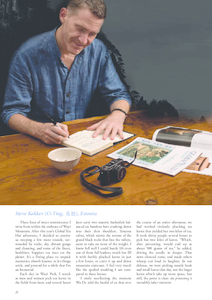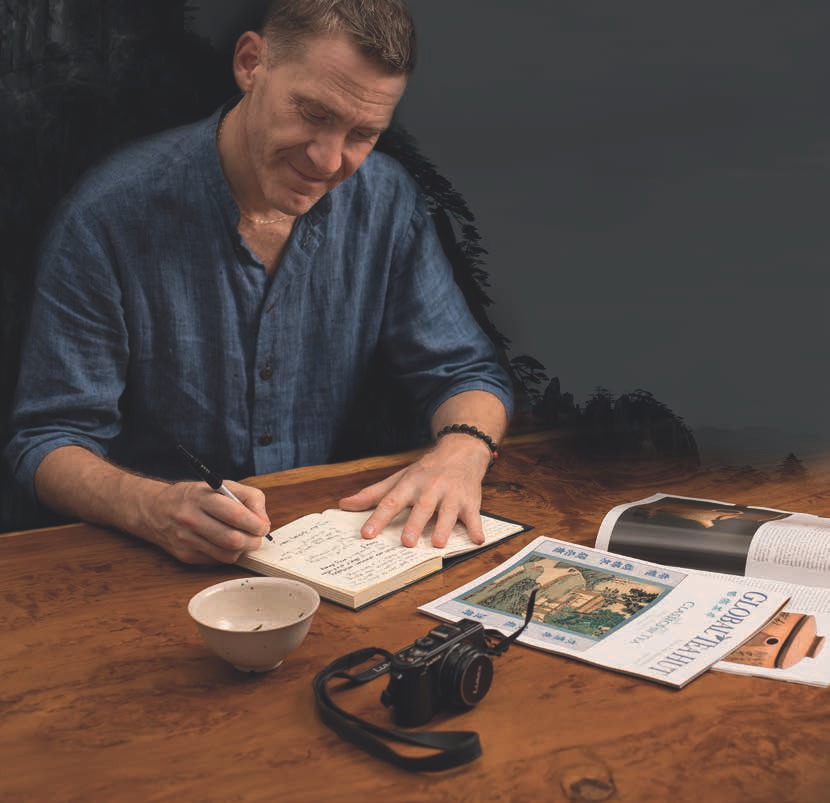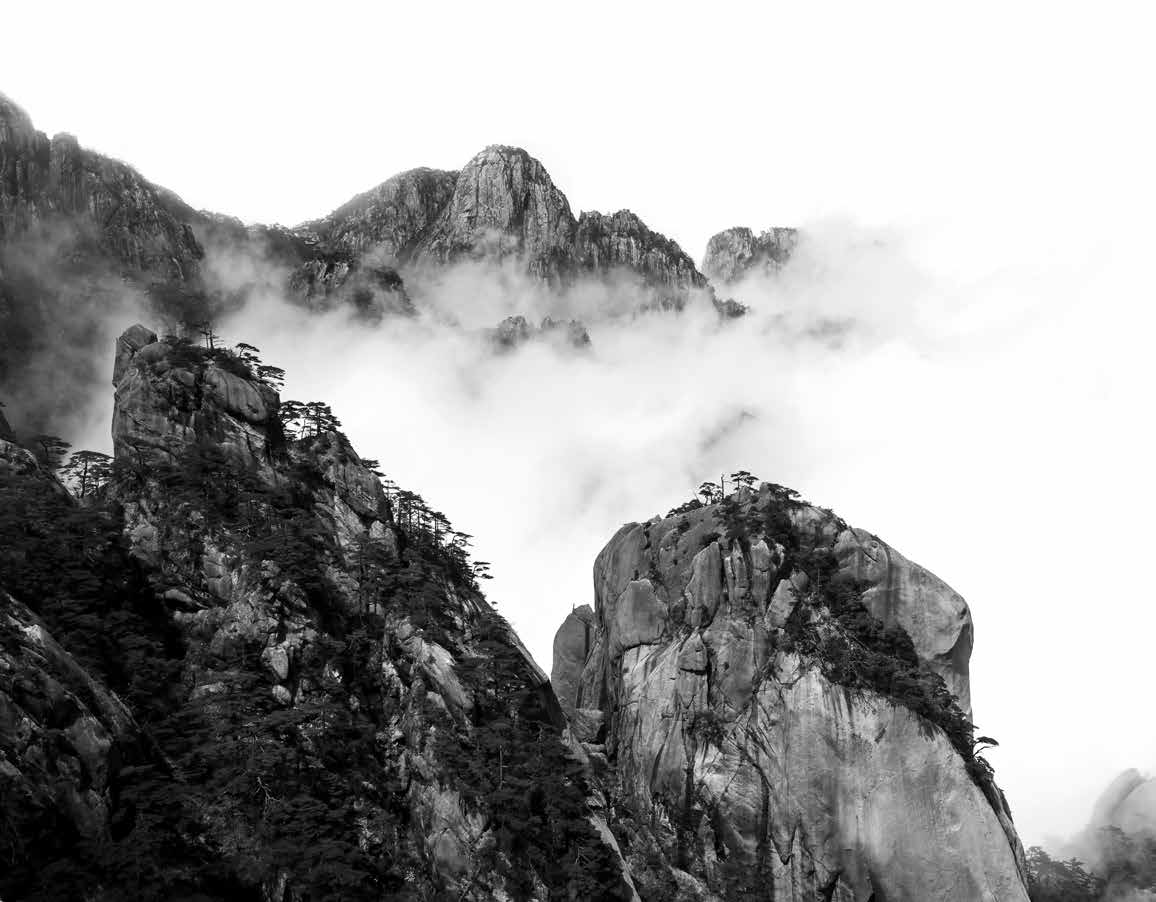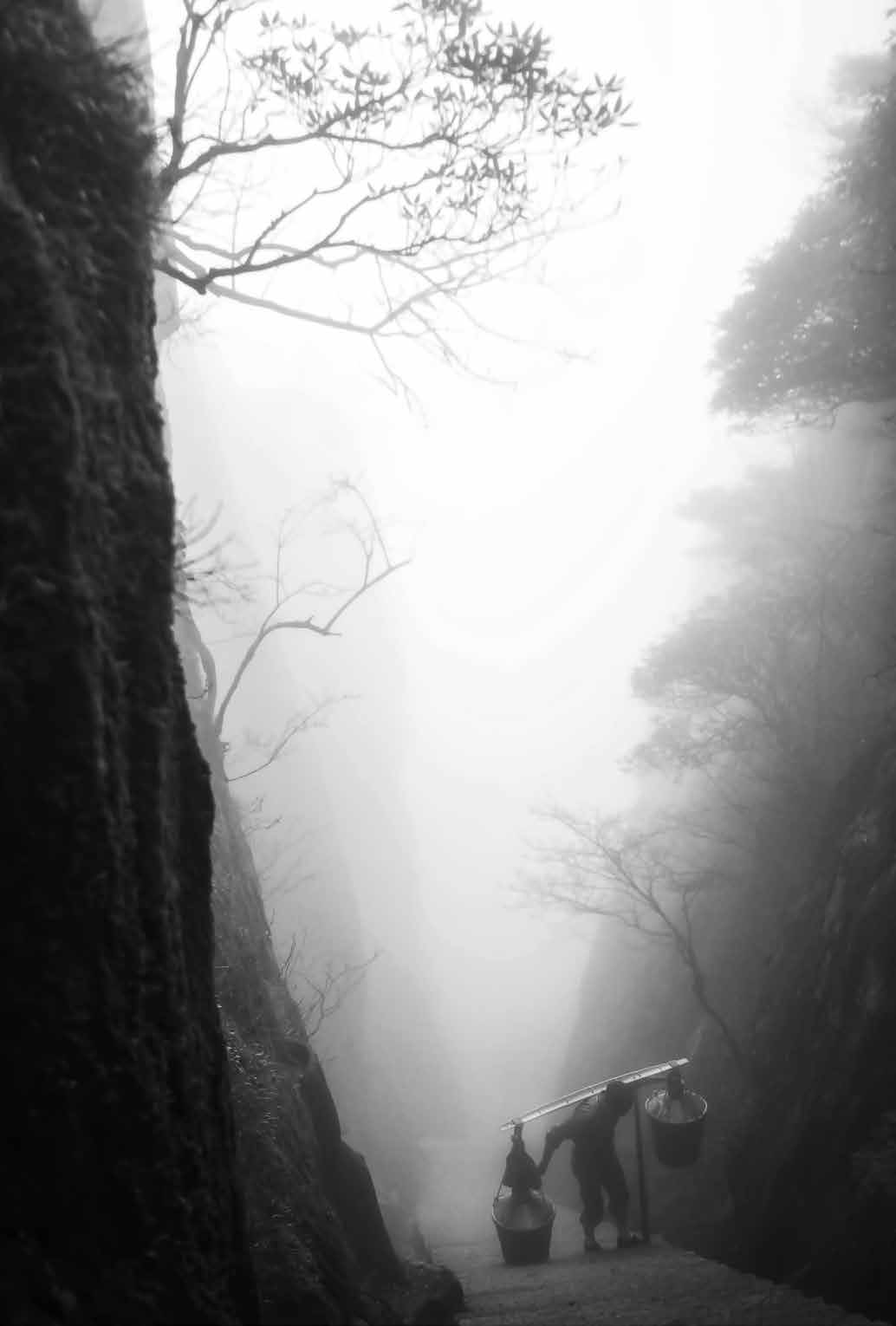
 |
|

These lines of sweet reminiscence I write from within the embrace of Wuyi Mountain. After this year's Global Tea Hut adventure, I decided to continue steeping a few more rounds, surrounded by rocks, sky, distant gongs and chanting, and some of the finest, healthiest, happiest tea trees on the planet. It's a fitting place to unpack memories, absorb lessons, to let things settle, and pretend for a while that I'm an Immortal.
Each day in Wuyi Park, I watch as men and women pick tea leaves in the fields from 6am, and several hours later carry two massive basketfuls balanced on bamboo bars crushing down into their thin shoulders. Sinuous calves, which mimic the texture of the grand black rocks that line the valleys, seem to take on most of the weight. I know full well I could barely lift even one of those full baskets, much less fill it with freshly plucked leaves in just a few hours, or carry it up and down mountain staircases. I feel very much like the spoiled weakling I am compared to these heroes.
I smile recollecting the moment Wu De told the busful of us that over the course of an entire afternoon, we had worked tirelessly plucking tea leaves that yielded but two kilos of tea. It took thirty people several hours to pick but two kilos of leaves. "Which, after processing, would end up as about 500 grams of tea," he added, driving the needle in deeper. That news silenced some, and made others whoop out loud in laughter. In our defense, we were picking mostly buds and small leaves that day, not the larger leaves which take up more space, but still, the point is clear: tea processing is incredibly labor intensive.
Each and every step of the way, there is mastery and labor involved. There's the endless plucking of just the right leaves, which locals do smiling, singing or engaged in light gossip. Not grumbling about their long days and inattentive bosses. Then there's the lugging down to processing stations; spreading the leaves out under the sun seems a break from labor but even that requires skill to lay them evenly. Depending on the tea, there's also shaking, rolling, shaping, drying, sorting - all that before packing and shipping. Only then does our steeping ask for equal mastery and patience. Alas, if we could only master just one of these steps in a lifetime!
An avid group of Global Tea Hut members such as us already knew some of the intricacies of tea processing, but to experience a fraction of it ourselves I think left us with one of the longest-lasting gifts we could ask for. As the saying goes: "Tell me and I'll forget, show me and maybe I'll remember, but let me do it and I'll never forget."
In our case, our intellectual understanding about tea processing became visceral knowledge several times in and around Qimen. Twice, we were entrusted with baskets around our shoulders to pick the spring leaves, which must have trembled as we approached. Once, we even tried our hand at drying leaves the old way, over a cauldron of burning charcoal. We tried, gingerly but with bravado, to evenly toss the square bamboo tray of leaves in a specific rhythmic way that dried but didn't burn the leaves, and didn't scatter them all over the floor or plunge them to untimely deaths on the charcoal - all easier said than done. Not burning our fingers was an unexpected challenge. For most of us, one of those consequences seemed inevitable, but we tried our best. When, in the end, I jokingly asked our host farmer if we were hired, he didn't miss a beat, exclaiming, "No!" - with a big smile of course.
Understanding how difficult it is to process tea is important because it sharpens our resolve not to waste any! When we use too many leaves to make a brew that would have easily made a better pot with fewer, we waste other people's efforts, along with the leaves themselves, in trying to force some experience for ourselves or our guests. It's as if we're trying to squeeze the juice from the leaves and extract an experience. When we misbrew or steep fewer times than the leaves themselves offer, we toss away in a flash something that Nature and human hands have spent finite energy to bring to us. We all do this kind of thing unknowingly all the time, every day. It's the nature of our un-mindful, throw-away consumer society.
Ah... sneaky me. I skipped ahead to one of the trip's biggest take-aways, perhaps in fear that some might not make it to the end of this article. But let's back up a little now. First, a linear outline of the trip to help get our bearings.
We were just under thirty Global Tea Hut members from about a dozen countries, plus five Taiwanese tea lovers including our patron saint Mr. Liang. Our guide this time was the radiant Raymond, a swashbuckling type who seemed to have stepped out of a Chinese western film, only with much better fashion sense. We all met in the town of Huangshan (most casually the night before the trip started on the romantic streets of the Old Town), where we spent a couple of nights before heading out to Huangshan Mountain itself. We spent three nights atop the mountain in a hotel accessible only by cable car and hiking (or helicopter, but I doubt anyone in Global Tea Hut would choose or could afford to arrive like that).
From there, we quick-bused it to Qimen where we had a few days of tea processing, then headed over to two cities famous the world over for porcelain and clay-ware, Jingdezhen and Yixing respectively. From there, we took a ride back to Shanghai where a final feast sealed the deal, as did multiple, harried goodbyes over breakfast the next morning.
Did I remember to mention that in the middle of all that were sumptuous delectations of 1930s Liu An, 1970s Liu Bao, 1960s Blue Mark and 1930s Tong Qing Dragon Horse? We each had a chance to either steep these teas or serve as cha tong for their preparation. Not only did we all wish to do our best to give as harmonious an experience as we could to our fellow Chajin, we all wanted to rise several levels to do as much justice as we could to the teas themselves.
Although each of these sessions was remarkable, likely the one which struck deepest was the Liu An session, as it took place in a fancy tea museum in Qimen. We had been given a fabulously giddy guided tour and visited a laboratory for taste-testing (oh how we spoiled tea brats verged on snobbery there, the quality of the teas being not quite up to our standards). Everything was rather stiff for us more bohemian, sensitive types, so brewing this special tea in silent reverence, shifting the overall atmosphere, seemed a way of expressing the transformative power of Tea to go beyond linear thought. I will remember the softened eyes and hearts following this session for a long time.
Among the most touching moments of each trip occurs while at the end of it when we each share our reflections. It's another occasion to take in the beauty, openness and vulnerability of others, crack a last joke or get an opportunity to learn through the reflections of fellow consciousness. There were more highlights to recall, as there were more people on this year's trip, but the stunning scenery of Huangshan was common to most as among the starkest experiences we'd had.
Though there are no tea bushes growing in the cold, rocky terrain which stands near the top of the list of China's most-visited natural attractions, what we saw struck a deep tea chord, as the landscape looks just like a living incarnations of almost every traditional scroll painting we'd ever seen, hanging on walls not far from where tea gets prepared. We had an eerily surreal feeling of floating inside of a painting.
Most memorable was our introduction to the mountains as they were shrouded in thick fog when we first arrived. Visibility was but a few meters through luminescent clouds on the cable car up, and for several hours we were teased by Nature, when massive cloud curtains briefly parted to reveal glimpses of unspeakable majesty just beyond, then closed again allowing us to be "cloudwalkers" once more. Hundreds, then thousands, of rocky steps up and down led us snaking along rocky cliffs and mountain faces, through narrow valleys and along heavily touristed pathways sparsely dotted with hardy trees.
Emerging from tiny crevices on the vertical mountain rock faces were bonsai-like pine trees, perched tenuously, roots gripping onto God-knowswhat, spreading out horizontally in a dance that celebrated their loneliness. The fog was indeed our friend, playing tricks with our minds and expectations. There were audible gasps from the group as the wind picked up and suddenly a majestic vista would appear in front of us, jagged and oddly formed scraggly mountainscape as far as the eye could see, appearing where moments before the gray-white fluff had acted as a physical boundary of sorts. Suddenly our sense of space, whereabouts and belonging would explode and scatter widely.
On another morning before sunrise, the fog was so thick that bare branched trees appeared like the black and white brush strokes of a Chinese traditional painting writ in the air itself. Or like live Rorschach blots in majestic IMAX 3D.
We breathed this mountain air for three nights, with the occasional tea session and evening discourses which kept our wandering minds from straying too far from the Dao part of our Cha Dao expedition. The ethereal magic of Huangshan stayed with us for many days after we left - for many of us at least, in the form of calves throbbing with pain and hearts with memories. Fortunately, that pain was soothed in the glorious hot springs we visited for a few hours on the way down from Huangshan.

A large part of these trips' significance to all of us is a sense of being brought to a source, the spot where a long and flowing river begins its course over long distances, nourishing untold numbers of people. This is never expressly told to us, but when the realization dawns on us that we are being humbly shown the origins of so much that we cherish dearly, it can be overwhelming. In Yunnan, on previous trips, we were brought to the birthplace of Tea on this planet. This time, the same feeling arose when we were shown the inspiration behind thousands of Chinese scrolls and paintings (Huangshan), the origin of some of China's most revered pottery (Jingdezhen), tea's most beloved steeping companion (Yixing clay), as well as traditional methods of picking and processing tea (in Qimen).
When we engage with these aspects of tea culture in the future, we will hopefully, with guided focus, an open heart and good memories, be able to tap into some of the aspects of tea history that we experienced.
Source came not only in the form of geographical locations, but incarnated in the people we were lucky enough to meet. In the easy-to-ignore subtle smiles of the farmers who welcomed us, in the genuine smiles of the cooks who prepared endless feasts for us, in shows of incredible generosity and humbling hospitality few westerners are used to and in the quiet burning wisdom of the people who have been growing and processing tea since childhood.
On this trip we were also graced by the presence of Mr. Liang, always ready with a sardonic quip and eager to help us deepen our knowledge of all things tea related. He is a dear friend, and despite the fact that we could not communicate, we had tea. Henry from Malaysia joined our crew for a few days, precious Liu Bao in tow, happy to give us lessons in tea pouring energetics. And few of us will ever forget meeting Master Zhou and his wife, Master Chen, in Yixing. We were too big of a group to visit his home this time, but he brought his at-home feel with him to the restaurants where he treated us to meals, and to the huge welcome he organized for us.
Our presence became the reason for the 2017 International Yixing Tea Gathering, with banners and posters trumpeting our arrival (had we known, we would have worn our best clothes, which we instead chose to wear in the tea fields for the most fashionable tea harvest Qimen had ever seen). We thought we were dropping in for tea. Instead, we arrived at a massive Tea Institute of some sort which had been set up just for us. We had gifts bestowed upon us before we brewed some deeply moving 1970s Liu Bao that Henry was kind enough to bring for us, before settling down to watch Master Zhou create an Yixing pot for us to observe the process.
He did the sped-up version for us, doing in a few hours what would normally take a few days. And yet his focused skill was there 100%. Most of us were hypnotized to watch not only the craftsmanship, the myriad details we could never imagine go into creating a teapot, but also by the sheer concentration and focus with which he approached anything he did. It was like getting a chance to see an Olympic athlete train, a grandmaster swordsman prepare for battle, a world class botanist enter his most cherished garden or a concert pianist expressing the piece of music which they held dearest to their hearts.
Indeed, Master Zhou exhibits this ability to be focused, present and highly efficient in everything he does, from ordering lunch, hurrying us onto the bus so as not be late for our next appointment, scurrying up the side of a mound to dig up some Yixing clay to show us all or focusing on the micro details of the holes in the inside of a teapot's spout. His skillful handling of life's big and small moments was an inspiration to many of us. I could see the way he lived in the way he made a teapot, and his way of teapot-making in his life as well.
As always, despite the many highlights of the trip itself, and above the dizzying lessons and experiences, sights and sounds, it was the moments of interpersonal dynamics that were most meaningful and significant to everyone. As a species, we are hard wired from birth to be sensitive to subtle cues from others, and we understand ourselves only in relation to others around us. We grow most profoundly from our experiences with one another. No matter how amazing a trip can ever be, it is the words and play with others that offer the greatest potential for growth, fun and life itself.
As tea persons we are naturally a pretty solitary bunch, many of us shy and not group-oriented (or so we think). I know a number of us met the news of a "bigger than usual group" with some trepidation. (I certainly did!) Yet each time we stepped just a few centimeters out of our comfort zones, or gently ignored a thought which told us we needed to be silent, alone or fixed on an electronic device during this bus ride or that evening back at the hotel, and instead asked a question of the person in the next aisle or invited someone in for a smaller tea session - well, that's when the small miracles really occurred. It doesn't take much to allow magic to happen! (Kudos to every one of you who stretched beyond your usual self.)
If Tea opens Herself up to us commensurate to the focus and stillness we bring to Her, imagine what we receive when we bring that openness and stillness to another living being. We are humans, after all, not part of the plant kingdom, and so our deepest, most resonating rewards come from active reaching out and being open to the approach of others at the right time. Some of the most beautiful moments of the trip occurred in seeing shy people slowly unfurl their semi-obscured blossoms.
Sometimes, all that was needed for this was an invitation to tea, or a dance party in a hotel room, a corridor chat fest, an invitation to share our positive feedback about others to them directly, or not passing up an opportunity to be silly and playful. And when all else failed, the sound of Neil's laughter always caused group hysteria. Swapping Chinglish mistranslations was also good for a bonding laugh (my favorite was posted above a urinal, seemingly trying to persuade guys to advance closer to avoid dripping: "Civilization a big step forward one small step").
For me, the potential gloriousness of group dynamics (and I'm writing from a loner, one-on-one type of general mindset) came on our final bus ride together, from the delightful gluttony of our final Shanghai feast back to our hotel. Lipps Inc.'s long version of "Funkytown" was blasted and most of us were dancing together in the aisles, replacing the single-worded chorus with the names of the places we had just visited: "Won't you take me to... Qimeeeen. Won't you take me to Huangshaaan... Yixiiiing..." Arms waving in the darkened bus, speeding along futuristic highways and cityscapes, it felt good to be part of this tribe, and to be reminded that the more you reach out, the more you'll receive.
Thanks to everyone for taking the risk to show yourselves. My heart sings to see that you all just received positive feedback for the effort! For many, the essence of the trip began after the trip ended, in the absorption and integration of everything that had happened in such a short time. Like steeping a tea many times, we too are dedicated to not letting any of it go to waste - any of the precious effort that was expended on our behalf to provide such priceless experiences. Time to digest, transform and offer it all forward...

